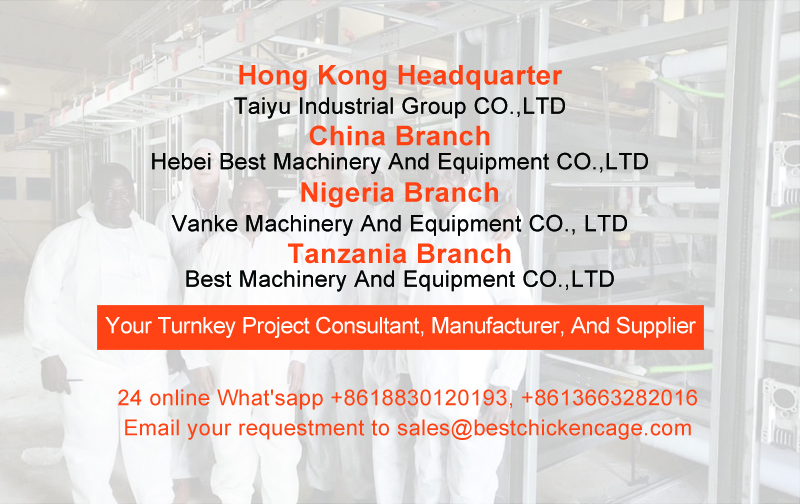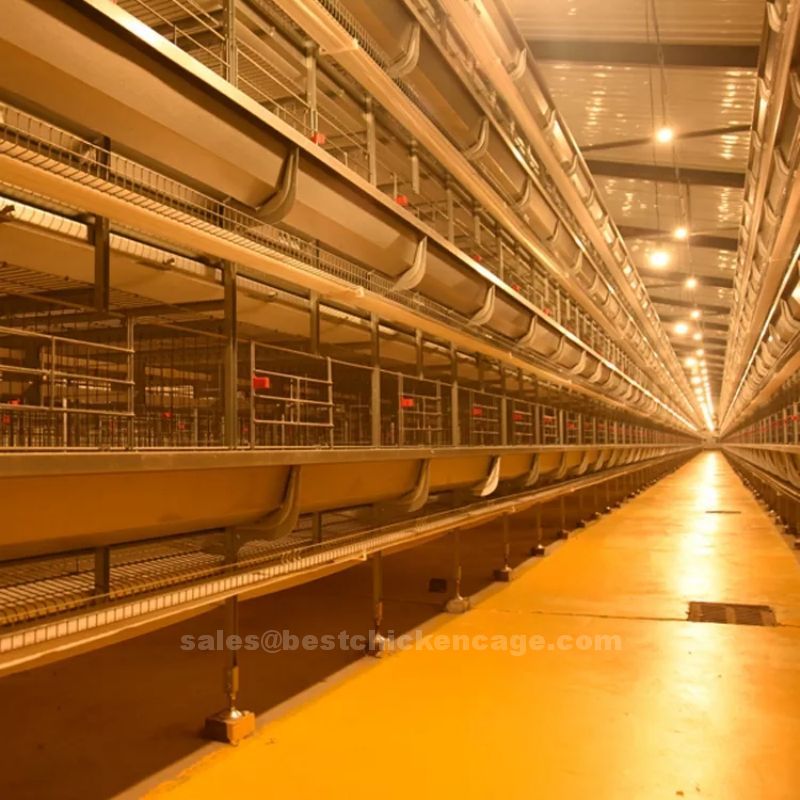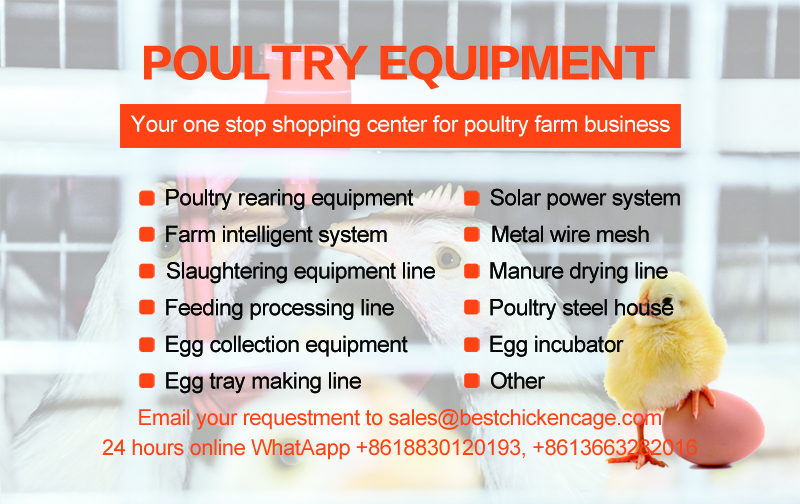E-mail:sales@bestchickencage.com
E-mail:sales@bestchickencage.com

Chicken house
A chicken house is a structure designed to house poultry, primarily for egg production or meat production. It provides a controlled environment for chickens to live, eat, and lay eggs while protecting them from predators and harsh weather conditions. Chicken houses vary in design, ranging from simple, small-scale shelters to large, industrial-scale facilities equipped with advanced automation for feeding, watering, temperature control, and waste management
Key features of a well-designed chicken house include proper ventilation, sufficient space for each bird, a clean and dry environment, and systems for efficient waste management. Larger chicken houses, especially for egg production, may use systems like the h-type layer chicken cage, which allows for high-density housing, reduces labor, and improves productivity
The goal of a chicken house is to ensure the health and well-being of the birds while optimizing production and minimizing labor and costs. Proper maintenance, sanitation, and attention to animal welfare are crucial for the long-term success of the chicken house

Chicken house
The production process of chicken house:
1. Setting up the chicken house: The chicken house is designed and equipped with proper infrastructure, including ventilation, lighting, temperature control, and automated feeding and watering systems
2. Egg or meat production: Hens are placed in the house once they reach maturity. The egg-laying cycle begins, and hens are provided with a balanced diet through automated feeding and watering systems. Broilers are raised in the house until they reach the desired weight. They are fed a protein-rich diet through automated systems, and health checks and vaccinations are conducted regularly to ensure their well-being
3. Harvesting and collection: Eggs are collected either manually or through automated systems that transport eggs to a collection area. The eggs are inspected, cleaned, and stored for distribution. Broilers are slaughtered and processed in a facility where they are cleaned, eviscerated, and packaged for sale
4. Waste management: Automated systems like manure belts or trays collect chicken droppings, helping to maintain cleanliness and reduce the risk of disease. Manure is often composted and can be used as organic fertilizer, contributing to sustainability
Let us send you the required information by post. Just click on this link to let us know which products you are interested in
1. Automatic poultry cage system

Bookmark our website and leave message on our website now to getting guiding to choosing right poultry equipment and enquiry for your poultry farm, we are the designer, manufacturer and supplier of poultry farm turnkey projects
Parameter
|
Parameter |
Description |
|
Temperature control |
Maintaining optimal temperature for chickens, typically 18-24°c (64-75°f) for hens and slightly higher for broilers |
|
Ventilation |
Ensuring proper air circulation to reduce humidity and harmful gases, maintaining a clean and healthy environment |
|
Space allocation |
Providing sufficient space for each bird to prevent overcrowding, ensuring their health and comfort |
|
Lighting |
Regulating lighting to stimulate egg production in hens and promote healthy growth in broilers |
|
Feeding and watering systems |
Automated systems delivering balanced feed and fresh water in the right quantities for optimal growth and production |
|
Waste management |
Effective removal and disposal of manure using automated systems like manure belts or trays to maintain cleanliness. |
|
Health and disease management |
Regular health checks, vaccinations, and biosecurity measures to prevent diseases and ensure optimal productivity |
|
Production efficiency |
The ratio of eggs or meat produced to resources used (feed, water, labor), aimed at maximizing productivity and reducing costs. |
|
Egg collection and handling |
Automated or manual egg collection, ensuring eggs are collected gently to avoid breakage and maintain quality |
|
Waste-to-product conversion |
Converting manure into organic fertilizer through composting, reducing environmental impact and promoting sustainability |
Our services
1. We provide and install automated feeding, watering, and egg collection systems to enhance efficiency and reduce labor costs in your poultry operation
2. Our team installs advanced manure removal systems, including automated manure belts and composting solutions, to maintain a clean and healthy environment for your chickens
3. We design and implement temperature control systems, including heating, cooling, and ventilation solutions, to ensure an optimal environment for your poultry year-round
4. Our services include the installation of ai-powered health monitoring systems to track the well-being of your birds and detect potential health issues early, ensuring high productivity and low mortality rates
5. We provide automated systems for the collection, cleaning, and storage of eggs, minimizing breakage and contamination while improving collection efficiency
6. We offer ongoing consultation, regular maintenance, and troubleshooting for all poultry systems to ensure smooth operations, extend the lifespan of equipment, and maximize farm productivity
Frequently asked questions
Q: How can i optimize the ventilation system in a chicken house?
A: Optimizing ventilation involves a combination of natural and mechanical systems. You should ensure the proper balance between inlet and exhaust fans, and consider using temperature-controlled systems to adjust airflow based on environmental conditions. Ensuring good air circulation reduces the buildup of harmful gases like ammonia and maintains optimal humidity, which is vital for chicken health
Q: What are the most effective temperature control methods for a chicken house?
A: Temperature control can be achieved through a combination of heating, cooling, and ventilation systems. In cold weather, using space heaters or radiant heat systems can maintain warmth, while in hot weather, cooling fans, evaporative cooling pads, or misting systems can help cool the house. Insulating the chicken house also prevents extreme temperature fluctuations
Q: What are the best practices for ensuring proper waste management in a chicken house?
A: Regular cleaning and use of automated manure belts or trays are essential for waste management. Manure should be removed frequently to prevent it from accumulating, which could lead to health issues and unpleasant odors. Consider composting the manure or converting it into organic fertilizer, which can be used on crops or sold as an additional revenue stream
Q: What are the latest advancements in automation for chicken houses?
A: Recent advancements in automation include the use of artificial intelligence (ai) to monitor chicken health and behavior, automated egg collection systems, and advanced feeding systems that adjust the quantity of feed based on the birds’ growth stages or activity levels. Some systems even include robotic cleaning and manure management systems, improving efficiency and reducing labor costs. Additionally, climate control systems now integrate real-time data to optimize temperature, humidity, and ventilation automatically
SEND YOUR MESSAGE TO US
(* We will reply your inquiry to this Email as soon as we see it.)RECENT BOLGS
CONTACT US